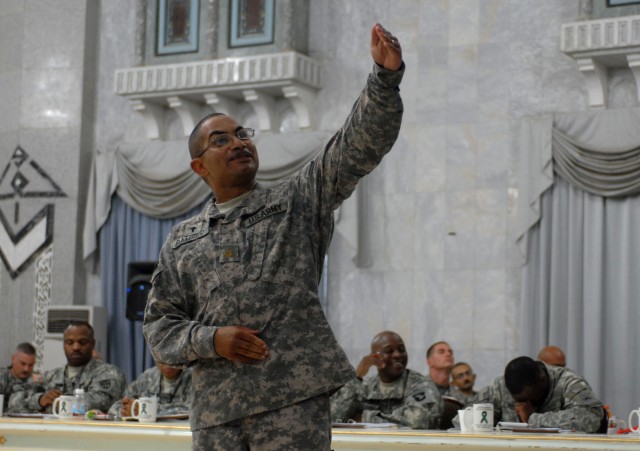
BAGHDAD - Equal Opportunity advisors and leaders from all parts of Multi-National Division - Center gathered for a conference at Camp Victory to discuss issues facing deployed Soldiers Aug. 26 - 27. The 2-day event, billed as a human relations conference, focused heavily on the topics of sexual assault, sexual harassment and ways to prevent them. "The specific purpose of the conference is to bring together all of the deployed Equal Opportunity advisers and deployed sexual assault response coordinators and provide them with an awareness of the program in the corps environment," said Lt. Col. Vance McCleod, equal opportunity program manager for 10th Mountain Division. "This is the first time all of the DSARCs and EOAs have come together. First and foremost, it is to meet and connect with everyone and then to discuss common policies, procedures and ways of doing things here in a deployed environment," he said. During the first day of the conference, representatives of the Multi-National Corps - Iraq Staff Judge Advocate's office gave a short presentation on the increasing ability of deployed military commanders to deal with sexual offenses by civilian contractors. The issue of offenses committed by contractors overseas is a prominent one, and two tools have emerged to deal with the problem. In some cases, contractors can now be prosecuted according to the Uniform Code of Military Justice, and it is also possible for the U.S. Department of Justice to prosecute offenders upon return to the U.S. Chaplain (Maj.) Paul Ramsey, chaplain of Headquarters and Headquarters Company, 10th Mountain Division, gave a presentation called "Sex in the Danger Zone," aimed at giving EO advisers insight to the motives behind sexual harassment and assaults. Often times, Soldiers seek comfort in inappropriate relationships while deployed because of problems in their relationships back home, said Ramsey. "It is always more difficult for everyone in (a deployed) environment because the temptation is always there ... and it is always harder when you are away from those that you love and those you are committed to," said Ramsey. "The firmer you have that foundation in your relationship with the one you love back home, the more likely you are to make a positive choice when it comes to doing the right thing," he said. Above all, said Ramsey, "Right is a choice." "My mother-in-law used to have a saying: 'Don't know, don't do.' If you don't know if it's right or not, chances are you had best not go in that direction," he said. Most of the conference, however, focused on finding new ways for EO advisers and DSARCs to train Soldiers and raise awareness. "The Army is revamping, or taking a look at the sexual assault program as a whole," said McCleod. Programs currently focus mostly on Soldiers in home station environments, not deployed overseas, he said. A portion of the conference was to discuss how training might be improved to deal with sexual assault, as well as other EO issues, he added. "We're looking at past trends taking a look at the best practices that have been mentioned, and implementing those practices in order to have a more safe environment; an environment that is free from sexual harassment, free from sexual assault and free from discrimination, whether it's race, color, religion, gender or national origin," said McLeod. "Coming together in an environment like this ... we can come up with better training in a group setting, put our minds together and take a look at what works, what are the best practices - then we can take that training back out there," he said. Sergeant 1st Class Sundi Ganaway, who serves as both EO adviser and DSARC for 4th Brigade Combat Team, 3rd Infantry Division, said EO training needs improving to be more effective. Though it currently is mandatory training for service members, Ganaway said it needs to be taught in more interesting, interactive ways, but more importantly, it needs the support of commanders. "If we conduct (training) on a regular basis and commanders place an emphasis on it, I think we can eliminate or at least try to reduce the number of EO incidents and sexual assaults that are all over theater," said Ganaway. The most important focus of EO training is simply in raising awareness of the and letting Soldiers know how to deal with problems they may encounter, she said. "(Soldiers) should know who their Equal Opportunity leaders are and who their EO advisers are, so they know who they have the resources to go to, and if it deals with sexual assault, they should know about restricted and unrestricted reporting options. That's the important thing to know," she said.

Social Sharing